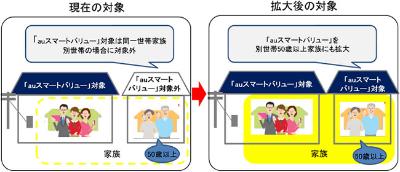Interview with KDDI Executive Director Ishikawa, the concept of the new au rate plan
--Flat-rate voice calls were introduced, and data communication moved toward a pay-as-you-go system. From the user's point of view, it may seem like a similar service, but au has added several elements to differentiate it. For example, communication charges for finely divided categories such as 2GB and 3GB are “tiered” according to the amount of usage that will differ for each user.
Mr. Ishikawa I thought that data communication charges should be divided into such fine details. DoCoMo has taken the form of sharing between family members, but as our company's usage increases, family sharing is frustrating when someone in the family uses it too much. I thought it might be. So I think the best form is a data gift. By the way, you can also refer to the cases of the United States and South Korea for the price. For example, in South Korea, there are more detailed settings, and we frequently give away data usage.
Mr. Kazukuni Tada (Second General Manager of Consumer Marketing in charge of billing) If the call charge is a pay-as-you-go system, you can get a general idea of how long the call will take. However, data communication is not a time axis, so it may be overused. Therefore, it will be a tiered type with an upper limit. If you are going to share it with your family, you will have to make a plan to use it to some extent so that other family members will not be troubled by someone using too much. However, au has a data communication volume for each individual, and if there is excess, it can be given as a gift. That's why I say "Data free life, abbreviated Dejira".
-However, at the new price announcement in June, there were many questions about the usability of the Data Gift.
Since Data Gift is scheduled to start in December, we have received comments such as whether senior customers can use it by then. Currently, we are considering a screen that can be easily operated by the application, including the form of selecting the destination based on the phone number. Stuffed user interface.

--Until now, voice calls were pay-as-you-go, and communication was a fixed rate, although there were breaks such as 7GB. The new plan is reversed. Of course, I'm looking forward to working on the user interface, but I think the big issue will be how many people will understand that calling and communication have been reversed. .
Yes. From now on, we will work on how to get smartphones to be accepted by the so-called late majority user group. What can you do there? This time, we completely changed the way of thinking about the fee because it was based on the flow so far. History repeats itself, and in the past it was criticized for being complicated with a wide variety of pricing plans. In the LTE era, we decided to use only one plan, but we began to hear that 7GB was too much for data communication. That's why we made it a more detailed shape, the so-called tiered shape.
Mr. Ishikawa Considering the price structure, I think the tiered model is the best, and if you combine it with au Smart Value, you will find it cheaper. Looking at the price of 10GB, au is 8000 yen (excluding tax, same below), but docomo is 9500 yen. Looking at the unit price per 1GB, as our company increases to 2GB and 3GB, the unit price drops in a clean flow. Other companies don't have very detailed tiers, and the price difference between 5GB and 10GB is only 50 yen. If there are no charges other than communication charges when sharing between family members, it seems that other companies will charge 500 yen, so au is not "correct" from the perspective of systems and charges. (laughs)
Assuming share, the part that is made more efficient should be considered as a discount effect. In the plan for sharing, it will be necessary to set the unit price somewhat higher. I don't know what other companies will actually do, but I think we have an advantage with a 10GB plan, for example.
--Softbank Mobile has lined up the price of 10GB as a campaign (* related article), but...
It is in the form of choosing data sharing between family members or carrying over to the next month.
-I see.
Features such as carryover to the next month are more of a flexibility mechanism on a per-person basis. It's a different story than family sharing.